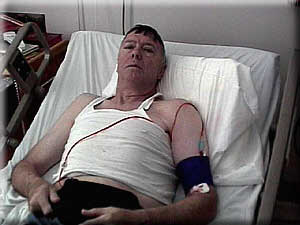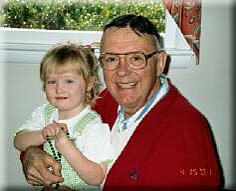Courage For The Battle Ahead
A highly decorated Lieutenant Commander, Frank Cowperthwaite retired from the United States Navy in 1978 after serving his country for 24 years. His career took him all over the world. After completing Officers Candidate School in Florida, Frank's assignments included serving as an Intelligence Officer in Vietnam, as a Naval Attache at the United States Embassy in Rome, Italy, and as a line officer aboard several WWII vintage ships such as the Brownson, Norfolk, Conyngham, and Little Rock.
Upon his retirement, he returned to civilian life in Virginia and successfully pursued a career in the real estate market.
Frank's health took an unexpected turn in the fall of 2000. He began to feel unusually out of breath. He noticed this anomaly after completing his regular weightlifting sessions. A lifetime Naval officer, he respected the importance of staying in tiptop shape, and never let go of this good habit. He tried to ignore the shortness of breath, but soon the discomfort began to include a sharp, piercing pain along his left side.
He made an appointment with his family physician, who sent him to a pulmonologist in Bethesda, Maryland. Several tests were taken, including chest films which showed a pleural effusion in the left chest cavity. On December 26, he underwent a thoracentesis at the National Naval Medical Center in Bethesda, Maryland. During the procedure, approximately 1300 cc's of blood-tinged fluid were removed. The fluid tested negative for malignant cells. Frank was sent home with a prescription for antibiotics.
Less than a week later, Frank returned to Bethesda in extreme pain. He was admitted and given Heparin and Percocet to control his discomfort. Chest films and a CT scan showed the fluid had returned. A second thoracentesis was performed, and again failed to reveal the presence of cancer. Over the course of the next two months, Frank had several follow-up evaluations, each time testing negative for cancer.
With the fluid continuing to return, Frank's doctors recommended a tissue biopsy to determine the cause. On March 7, 2001, he underwent a CT-guided biopsy which discovered reactive mesothelial cells. On April 17, he underwent a video-assisted thoracoscopy, which was converted to an open thoracotomy. During the procedure, the doctors noted multiple areas of tumor involvement. The tissue specimens were examined and the diagnosis was epithelial malignant mesothelioma.
Frank quickly met with oncologists at the National Cancer Institute (NCI)-Navy Hematology-Oncology Clinic in Bethesda, Maryland. Several treatment options were presented to him, including:
- Wait until you experience more and worse symptoms;
- Chemotherapy using Cisplatin and Gemzar;
- Possible inclusion into the SS1 mesothelin immunotoxin Phase I trial offered at the NCI; or ,
- Look for additional clinical trials nationwide.
After further reviewing his medical records, several oncologists at the NCI felt that chemotherapy was not a viable treatment. At the time, Frank voiced his frustration: "You know, mesothelioma has a way of spoiling a man's day. I have so many plans . . . now I can do nothing but sit around and wait."
To clear his mind, Frank took a brief vacation to Maine and Canada to visit family and friends. When he returned, he knew that he needed to begin some kind of treatment as soon as possible. His military training taught him to be on the offensive against his enemies. He summoned his courage to fight against the darkest enemy of all --mesothelioma. His body weight was down to 180 pounds from a normal 215 pounds. He was taking 40 milligrams of OxyContin and ten milligrams of Ambien and Zoloft. He chose the Phase I Study of SS1 (dsFv)-PE38 Anti-Mesothelin Immunotoxin offered at the NCI.

Mesothelin is a protein normally produced by cells lining the body's multiple cavities. It has also been found on cells in several types of cancer. SS1 binds very tightly to mesothelin. Pseudomonas exotoxin (PE) is a protein made by bacteria which can kill human cells if it gets inside. The experimental agent SS1 (dsFv)-PE38 is composed of a stable form of SS1 and a portion of the PE. It is hoped that the SS1 will attach to the cancer cells and permit entry of the PE, killing the cells.
On June 5, Frank checked into the NIH. On June 6 he underwent his first treatment. A narrow catheter was placed in his arm, traveling inside a vein, up through his shoulder, down the chest into his heart. The catheter was 16 to 18 inches long. The SS1 was then administered 24 hours a day for the next ten days. Frank's last treatment was on June 17. Frank suffered fatigue, some nausea, fluid retention, and a dramatic drop in blood pressure as a result of the experimental agent/clinical trial.
After his last treatment, Frank was discharged two days later. His second ten-day session will begin in July. He is scheduled for three complete sessions before being re-evaluated by his doctors. According to Frank, there has never been a mesothelioma patient invited back for a second session. He firmly believes that he will be the first.
While in the hospital, Frank has had much time to think about the future. Before Timothy McVeigh's execution, Frank observed, "Timothy McVeigh is lucky. At least he knows his death will be painless." It is sad to know that a man who served his country proudly for over 24 years, who put his life on the line in order to improve the lives of ordinary folks, who looked forward to a healthy and productive retirement, now faces the future with an unrelenting tumor inside of him that has no respect for modern medicine, good deeds or courage . Meanwhile, Timothy McVeigh, who dedicated his life to destroying this great nation, is calmly put to sleep.
Frank is a man who has faith that hope is part of the answer. A mesothelioma patient has few choices, as the tumor seems to call the shots. One thing the tumor can't take from Frank is his hope, optimism and yearning for a future he deserves. No matter the outcome, Frank chooses life, and deserves more.
*** POSTED JUNE 22, 2001 ***
An Update -- 7/13/01
Frank returned to the NIH last week in hopes of qualifying for the next round of SS1. After several tests his doctors determined that he would not be allowed to continue with the treatments. Frank will return to the Bethesda Naval Hospital next week and consult with one of their oncologist. Keep fighting, Frank!
Mr. Cowperthwaite passed away on February 13, 2002

